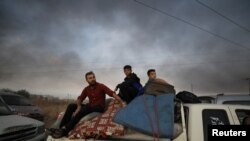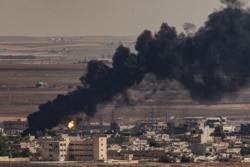The U.N. warns that conditions for hundreds of thousands of civilians caught in the midst of Turkey's military offensive in Kurdish-controlled areas of north-eastern Syria is rapidly deteriorating.
Turkey began its so-called Operation Peace Spring five days ago to oust the Kurdish Syrian Democratic Forces, which it views as a terrorist organization. However, most of the West views them as key partners in the fight against Islamic State. The civilian "collateral" damage of the Turkish operation already is huge.
The U.N. office for the coordination of humanitarian affairs estimates more than 130,000 people are newly displaced. OCHA spokesman, Jens Laerke, said most displaced people are staying with relatives and host communities, but a growing number are living in collective shelters.
He said U.N. figures indicate up to 400,000 civilians may require assistance and protection as the war escalates in the coming period. He told VOA it will be difficult to provide this aid because of insecurity and limited access to people in need. He says a number of NGOs have scaled down their operations and relocated their staff.
"We do have staff that remain there. Of course, their ability to operate there and provide relief is severely restricted and hindered by the ongoing hostilities. And, as I mentioned also, local authorities are reportedly imposing some quite strict security measures at checkpoints," he said.
The U.N. children's fund reports the water situation is deteriorating. UNICEF spokeswoman, Marixie Mercado said a vital water pumping station in Ras al-Ain that came under attack on October 10 remains out of service.
"This is a station that provides safe water to at least 400,000 people in Hassakeh governorate, including displacement camps. Technical and operational staff have not been able to get to the water station yet to repair it due to the ongoing hostilities," she said.
The U.N. reports among those being deprived of clean water are some 68,000 residents in Al Hol camp, which is run by the Kurdish SDF. Women and children comprise more than 90 percent of the population. Many are family members of Islamic State militants.
UNICEF says most of the 47,000 children in the camp are under age 12. It notes these children are living in legal limbo because their countries of origin refuse to repatriate them.
The agency is appealing to governments to reverse this decision, arguing the children should be treated as victims and not as perpetrators.





